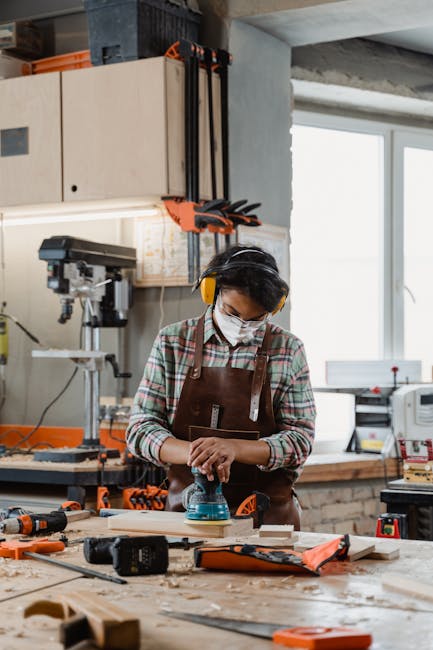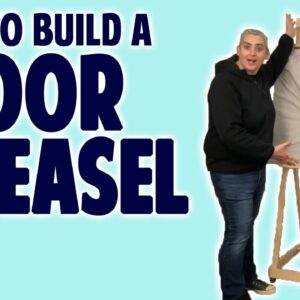Hey everybody it's Taylor with Boydston Grove
and today we're going to show you how to make a full-size floor easel! Let's get into it! For my floor easel, I'm going to be using four
one by twos that i picked up at the local hardware store. They come pre-sanded and pre-cut to six
foot long and that's the size that I want for my easel anyway, so there's no cutting to be done for
these pieces. For the rest of the pieces of the easel I'm going to be using these 1 by 3 cut-offs
that I have left over from another project. They're already all cut to around two feet so
that's perfect for what I need them for and i'm going to need a total of around nine. That means
if you're going to do this project, you're going to want to buy three of the six foot lengths of
these one by threes from the local hardware store. For the center rail of my easel, I'm just going
to be using one of the one by twos and splitting it in half.
I'm going to leave a little gap in
between them for the rails to be able to slide up and down. Now, there's three different ways you
can do this; you can split the piece of wood as I did, or you can use your router and just cut out
a groove down the center, or if you don't have any tools to do any of this, you can just buy an extra
one by two. I started by assembling the main frame of this easel which is pretty easy since all the
pieces are already cut to the length that I want. I screwed four of the 1x3s together
in an L formation to make two rails that will hold the canvases to the easel. I used the miter saw just to
clean up the ends of the rails. I cut four pieces of the 1x3s to fit
between the long rails of the easel. I attached them to the back of the canvas rails.
These will keep the canvas rails in place, on the easel, and help them to slide up and down more
smoothly.
When attaching the rails to the frame, I'm making sure to put the short side of the
L against the frame itself. That way the long side of the L is what the canvases will sit
on. That will give me a little extra room. I decided to use threaded inserts and star-headed
bolts for all the moving parts of the easel. That way everything can easily
be adjusted or removed if needed. I purchased the inserts and bolts as a kit
from Amazon. It comes with a wide variety of sizes of both. I'll make sure to leave a
link for the kit in the description below. I'm using three of the 1x3s to make
a base for the easel. To start, I added a threaded insert to each side of the
bottom of the easel frame to attach the base to.
I cut my last 1 by 2 in half to use as
adjustable legs for the back of the easel. While the frame was standing up, I used one
of the one by twos to mark the base pieces where I wanted the legs to sit. I made a total of
five cut outs on the two side pieces of the base for five different positions on the easel.
I spaced them one and a half inches apart and cut them out using a three quarter
inch forstner bit and a jigsaw. The positions are really a personal preference, as
to how you like your easel to sit while painting, so make sure that when you're
marking your base pieces, that you're keeping the easel at the position
that is most comfortable for you to paint at.

Once the positions were cut, I added the third
one by three and attach the base to the frame. In order for the back legs to fold up
flat up against the frame when not in use, I needed to add a few small blocks of wood
to the frame for the back legs to attach to. I was all out of the 1x2s, so I cut a
few pieces of a 1 by 3 and cut them to the same width of the 1 by 2s. Once attached to the
frame, I added a threaded insert on each one. Then I attached a 1 by 3 to the two
legs to keep them properly spaced.
Now, here's where I had to fix my
mistake. I grabbed the wrong size bit when I was drilling the holes for the dowel, so the dowel was really loose. That's okay,
I'm just going to put a couple screws in there to hold the dowel in place and I can always
take them out and replace the dowel later. Lastly, I added some really small casters;
two with locks to the bottom of the frame and the other two to the back
of the base. Despite their size, they're rated for 25 pounds each and
so that should be plenty strong enough. I found these on Amazon. I'll leave a
link for them in the description below. All right, our floor easel is finished and I'm
really happy with the way that it came out, especially the casters. I'm really surprised
because they're so incredibly small, but they actually roll really smoothly, they don't get
caught up, and it doesn't feel like there's any weight on them, and they're so low pro.
It's just
a really nice touch, makes it easy to work with. One of my favorite features about this
design is that I used the star bolts for all the adjustable features so
that with just a quick turn… you can adjust it to however
you want, along with the legs and everything. Another thing that I like about
this is that; when you're finished using it… it folds up completely flat and will fit behind a
door or under a bed for easy storage. One of the adjustments I did have to make is; I had to cut a
little bit extra off of each of these backboards on the back of this bottom rail so that it would
slide past the legs right here. I didn't bother putting any finish on this because after all, it
is for painting so it will get covered with paint and other things, so not really worried about
it.
If you enjoyed this video, make sure to like it. We have a full video showing you how to
make these art canvases, along with a full video showing you how to make a tabletop easel, so make
sure to head over to our channel, check those out, subscribe, and hit the notification bell. And
we would love to hear what you thought of this project in the comments below. Thank you very
much for watching! Be safe and have a great day!.

